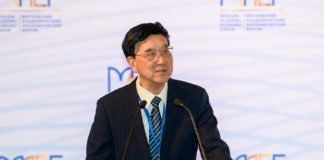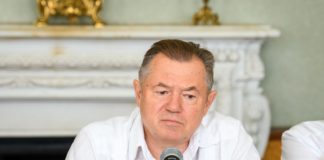The government must develop and approve the concept of technological development for the period up to 2030 until December 15, 2022. The concept should include, among other things, the goals of technological development and mechanisms for achieving them. Can Russia achieve technological sovereignty? And when?
Based on the materials of the program «Dom E», Public Television of Russia, September 23, 2022
Interlocutors:
Alexander Alexandrovich Chulok,
Director of the Center for Scientific and Technological Forecasting, Institute for
Statistical Research and Economics of Knowledge, National Research University Higher School of Economics
Sergei Dmitrievich Bodrunov,
President of the VEO of Russia, President of the International Union of Economists, Director of the S. Yu. Witte Institute for New Industrial Development, Corresponding Member of the Russian Academy of Sciences, Doctor of Economics, professor
Bodrunov: Many scientists, including myself, believe that scientific and technological progress is at the core of social and civilizational development. At all times, progress has given man the opportunity to satisfy his needs, which are constantly growing. Obviously, if we are talking about socio-economic development, we must think about how it is ensured by scientific and technological development. This process is going on in the world today at a very fast pace.
Technologically advanced countries have more economic advantages, their population lives better. Accordingly, the socio-economic development of Russia should be based primarily on technological development. The President of the country said the following on this occasion: «The main thing for the country is to maintain technological sovereignty. Only sovereign countries can count on a sovereign future.» Technological development and technological sovereignty are different concepts, it is not always possible to put an equal sign between them. What, in your opinion, are the criteria for technological sovereignty?
Chulok: There are no canonical definitions of technological sovereignty. Everyone gives their own. To summarize them, the main point is that the country should provide itself with important products, services and be independent from others. There are many nuances. What products and services? In what areas? During what period?
I would single out three components which are a cornerstone of technological sovereignty. The first is technological modernization should ensure the solution of the current tasks of socio-economic development related to security. These tasks are obvious. For agriculture, this is, for example, the absence of domestic seeds or amino acids, including lysine. For pharmaceuticals — shortage of raw materials. For aviation and mechanical engineering — dependence on imported components. The professional community is well aware of the bottlenecks that need to be “closed” here and now. The second component is that we need some kind of parity, because technological sovereignty does not mean isolation. Who will be our partner, how we will change “guns for oil” is the second question. The main thing is that we need a negotiating position with other countries. The third pillar is that technological sovereignty should contribute to future competitiveness. And here we have failed, because we started the discussion about the future only a few years ago.
What is the shape of the future? What are the global trends? Together with you we supported this discussion as best we could. But while we were talking about 2030, developed countries ran away in their reasoning until 2045—2050, and this is not because they are dreamers and have their heads in the clouds, but because the speed increased. Thanks to the same digital twins, crash tests in the automotive industry are no longer completed in six months, but in a few weeks. This means that while we are discussing 2030, we are not discussing the future, at best, the present. Therefore, the horizons must be extended.
Bodrunov: It is obvious that, among other things, the priorities of technological development should be determined by areas where we are still lagging behind. Where should the focus of attention be directed?
Chulok: The drama of the current period is that if in the last century it was possible to bet on one or two key technologies and get technological sovereignty, or at least technological parity, now we need to talk about technology packages. Individual technologies are of no interest to anyone. Everyone is interested in packages, starting with training and relevant competencies and ending with recycling, processing and disposal, which should not be forgotten.
Therefore, speaking about the priorities of the development of science and technology, it is necessary to highlight several principles. First, we need to define the landscape of the future to which we can or want to come. This is how the European Commission acted within the framework of the Seventh Framework Programme. They once distributed 84 billion euros on the basis of foresight, that is, long-term forecasts, an understanding of what future they want to come to. As an expert on large projects in companies or various initiatives, I often ask a simple question: “Imagine that tomorrow all your projects are implemented. What future will we get?” I have never seen such fear in people’s eyes when they try to figure that out. First, no one assumes that everything is implemented to the end. Second, there is no general picture. And the forecast for the scientific and technological development of Russia until 2030 was approved in 2014, and it needs to be updated, because the world has moved forward, trends have changed.
Bodrunov: Of course, it is necessary to correct the forecasts with a certain frequency.
Chulok: Next, based on the vision of the future, we need to choose what technologies we invest in. What technologies do we need for the agro-industrial complex? Maybe we need to develop neural networks? Maybe the key now is unmanned agricultural machinery? What fundamental technologies are needed for pharmaceuticals? What new materials will significantly reduce energy consumption? This is the way of development stated by market demand. And we also can move forward from technology, when we look at the landscape of technological development and determine where are those young shoots that can significantly change the technical and economic indicators? Like graphene, for example, which can fundamentally change its strength characteristics, material consumption. Combining market demands and the approach from science and technology will make it possible to come to an understanding of where to move in terms of technological sovereignty? But the first step is, of course, to outline the picture of the future, and taking into account what we are seeing now, it should be a scenario. These scenarios don’t have to be good, bad, and targeted. The bad will never be approved, the good will never come true. We have only one scenario: the target one. This is the rationale for one point of view.
We just completed a survey of companies just a few weeks ago. We asked: “Is the innovative degradation of Russia a challenge for you?” About 70% of Russian companies said that this is a big problem. More than 75% of companies believe that the popularization of science, knowledge, technological development is a window of opportunity. That is, the companies are ready. But if you look at the statistics, the level of innovative activity of organizations is extremely low: 10.8%.
Bodrunov: It seems strange, doesn’t it? On the one hand, everyone understands. On the other hand, no one does.
Chulok: What’s the reason? We recently analyzed the barriers to innovative development of companies. In the first place, as usual, is funding. No money, too risky. What do you want? Innovation is inherently risky. But if you dig deeper, those who are engaged in innovation are faced with the problems of a lack of qualified personnel, with issues related to the protection of intellectual property rights, with commercialization.
Bodrunov: We need to think not only about technological development, but also about removing these barriers. Then ideas on technological priorities will be in demand. It seems to me that this is a global macroeconomic and ideological task for today.
Chulok: A political task. Do you know how these barriers are removed? If you gather business, science, the state in one audience, and everyone starts talking about their problems, then nothing will change. We need to talk about the future. That is, when we do foresight sessions and immerse stakeholders, as we call them, into the contours of the future. We tell them about global challenges and opportunities. The future reconciles. People understand that their counterparts are not blood enemies. We’ve been hearing blames like “You, business, don’t want to finance science” or “You, science, do not want to turn towards business” for twenty years. They understand that they should be partners and can interact with each other. But it is important that the conversation should be substantive. Therefore, we are discussing something on technology packages. For example, here are 30 technology packages. On which of them are you ready to cooperate today? For what — tomorrow? Where is government assistance needed? This is a completely different conversation. It is specific and dedicated to the future. I can tell you that now the most demanded specialty, including for ensuring technological sovereignty, is a manager in the field of science and technology. We have a master’s program at the Higher School of Economics. And the competition is huge. Our graduates are bought up from the first year of the master’s program.
Bodrunov: It’s good that you opened such a direction. Maybe there are some other things that could combine science and production?
Chulok: I think it’s important to change the way we are accustomed to think. One of the key professions of the future is a translator from Russian bureaucratic into Russian scientific. From Russian scientific to Russian business, from Russian business to Russian expert. There are very few such translators. When we do foresights, we actually act as “bridges” or “translators” between different communities. We are forced to do this.
For example, our forecast for the scientific and technological development of Russia identified products and key features that will determine their competitiveness in the future. This is a bridge to marketers, because through the properties of products you can create demand, and a bridge to technology specialists, because it depends on technology whether your sensor will be biocompatible, non-volatile or not. It seems to me that universities can play the role of knowledge reactors here. Moreover, there are many forms of support like the program Priority-2030, which includes leading Russian universities or RECs (scientific and educational centers). I mean, there are formats, and there is good funding.
Bodrunov: We need to give a methodological basis.
Chulok: Exactly! It is necessary to set a methodological basis, I hope that we will act here as a kind of navigator.
Bodrunov: Speaking of technological sovereignty, the problem of import substitution arises. We have set this task for a long time. And it seems that we are engaged in solving it, but I won’t say that everything is up there now, but nevertheless it seems to me that the problem is not about companies not wanting to engage in import substitution, but that until recently it was easier to buy something abroad than to develop your own. On the other hand, it is not clear what to import? How to solve the problem of import substitution in terms of the need to achieve technological sovereignty?
Chulok: I would focus on the research system. With regard to technological sovereignty and import substitution, we need a regularly operating information base about what we have. It is necessary to identify chains — production chains, supply chains, value chains. This is not Newton’s binomial.
Bodrunov: For that matter, the economic efficiency of these chains.
Chulok: Once we identified those chains, understood their effectiveness, we can ask the question: is it better to replace the entire axis with imports or find new partners and cooperation? The first thing I would start with is the scientific base. It should act regularly, and not the way when it releases an analytical report, posts it, and that’s it. The second is an understanding of what expertises do we have. That means a deep inventory, including based on the analysis of big data. Understanding which competences we could assume, which ones we could pull out as part of the exchange. This is also a scientific problem, and it can be solved. There are, for example, our close partners in the Eurasian Economic Union, so why not improve relations with them? There is BRICS, which, it seems to me, is underestimated. Then African countries. Why not think about where we could make partnership? But for that we need research, systematic and scientifically substantiated one.
Bodrunov: As my colleague Sergei Yurievich Glazyev, Academician of the Russian Academy of Sciences, says, we need “reasonable” technological sovereignty. It seems to me that we should think about how to build relations with our partners in the EAEU, the SCO, and other structures that today demonstrate the desire to build a multipolar world, not only politically, but also economically. And the economy relies, as we said, on technological development. I am sure that we can build the sovereign future that the President of Russia is talking about, using many of the tools that were discussed today.
Chulok: And relying on people who will implement it.



